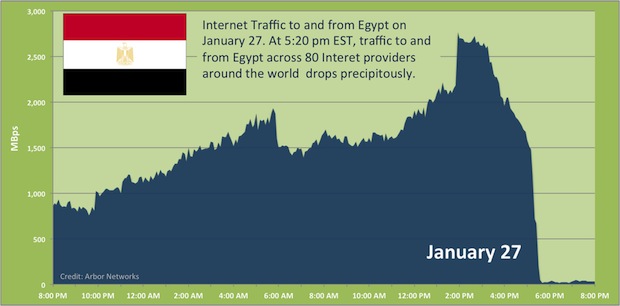
The Egyptian government, facing mass protests in the nation's streets by citizens calling for regime change, has shut off the Internet, SMS, and BlackBerry service--and may have shuttered some mobile phone systems too. Now the population is turning to 20th century solutions.
Earlier this week we wrote about mass pro-democracy protests on the streets of Egypt's cities, which were organized--at least in part--using social media like Twitter and Facebook, and with the same sites, along with Twitpic and its peers being used to share news and video and photo evidence about real-time events.
The government resisted the protests physically on the streets, but also launched a digital offensive--first shutting off access to Twitter on Wednesday, then Facebook on Thursday. For a while protesters were seemingly able to skirt the blocks by using proxy addresses, but the tweeting may have had an unexpected negative effect: The police were gathering at pre-arranged protest sites ahead of time, to dissuade protesters, suggesting they appeared to be utilizing information gleaned online.
Now Internet access across the whole nation has been shut off, as the Net traffic volume chart from Arbor Networks embedded here shows. As an investigation by Renesys demonstrates, at around 12:34 in the morning local time "virtually simultaneous withdrawal" of all Egypt's networks connected to the world's IP routing system--meaning data access routes into or out of Egypt were shut down. It's a complete order of magnitude more severe censorship that happened in Iran, when the government tinkered with blocking social media sites, and is far worse than the "modest Internet manipulation" that the Tunisian authorities tried as similar protests happened there. Essentially the Egyptian government has realized it cannot stay one digital step ahead of its population, and has simply thrown the off-switch.
Initial investigations showed that some Egyptian ISPs were allowed to maintain tightly limited links to the rest of the world, and Renesys's tests showed that the Egyptian Stock Exchange website was accessible through its ISP Noor Group via some restricted IP addresses. This may not now be the case, as the exchange website seems to be accessible. Some reports from inside Egypt suggest Noor's dial-up DSL service may still be operational, but these have yet to be confirmed--however there is still much activity on Twitter that implies Noor's service may be working in places, and users are being encouraged to remove their Wi-Fi passwords to enable freer access.
There are also scattered reports that SMS service across the nation is being disrupted, and it also appears that mobile phone services, at least in Cairo itself, may also be closed down.
According to at least one tweeter, Al Jazeera's live station, Al Jazeera Mubashar, may also have been blocked inside Egypt--to prevent its coverage of the protests and increasing reports of police brutality from fomenting more protests:
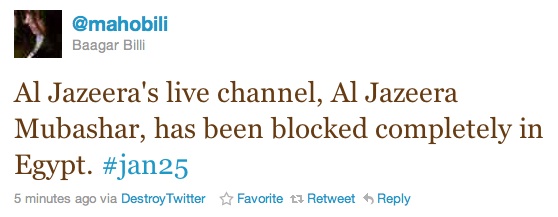
According to CNN's Cairo reporter Benn Wedeman in a tweet, the police brutality is extending to journalists recording the events--with police officers attacking reporters and camera men, breaking their equipment and confiscating it. BBC tweeter Lyse Douchet notes in a tweet that her Arabic colleague Assa Alsawy "arrives office, white shirt red with blood, beaten by police." He appeared on camera looking like this: (via tweeter weddady)
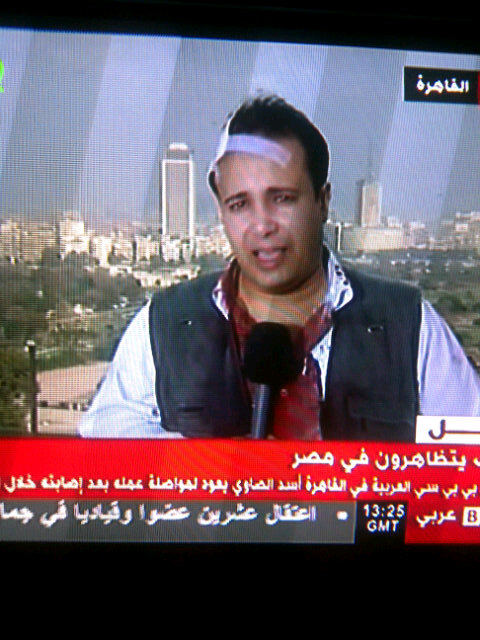
These latest moves are almost certainly aimed at controlling the spread of news about the protests to the rest of the world.
Egypt's government would seem to be shutting off the 21st century, declaring a war on tech, just to keep its population under control.
Meanwhile, though the security forces seem to be clamping down on the streets, and the digital battle seems to be won by the government, there's also news that old-fashioned social networking solutions are being used to permit discussions and organize protests:
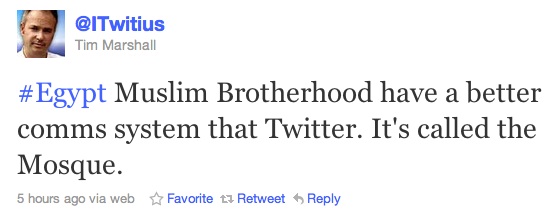
Other reports suggest that ham radio operators may be trying to help coordinate protests and the spread of news--using an older technology that's far harder for the government to interfere with as it's point-to-point.
And, as the Guardian newspaper points out, Egyptians have also resorted to handing out quickly-printed paper flyers to encourage participation and spread news:
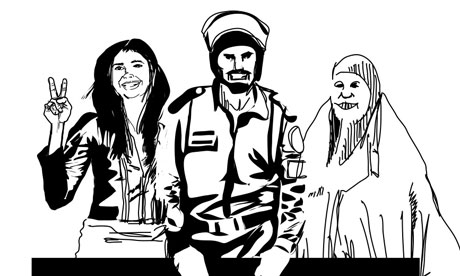
Read more of our coverage on the protests in Egypt.
To read more news on this, and similar stuff, keep up with my updates by following me, Kit Eaton, on Twitter.
Kelly Clarkson Natalie Portman Jessica Biel Christina Milian Kelly Brook
No comments:
Post a Comment